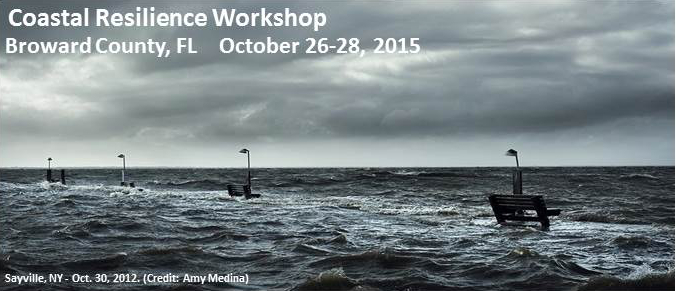Description
This section presents a synthesis of the major outcomes from the coastal resilience workshops. This paper is based on the presentations and discussions that have been guided by the Chair and numerous stakeholders such as university researchers, Non Governmental Organizations, and federal, state, and local governments. SURA’s workshop series promotes collaboration and fully-integrated processes, and it should be noted that the actual workshop is only a first step; the follow-up work is likely to continue for years. The major results from this workshop relate to the development of trans-disciplinary approaches that help a community to "bounce back" after hazardous events such as hurricanes, coastal storms, and flooding – rather than simply rebuilding in the aftermath. The workshops have included participants from academia, industry, and government. They provide opportunity to share coastal resilience research and projects focused on helping the community to rebound quickly from climate and extreme weather related events, including sea level rise. The purpose of the paper is to showcase how social and natural scientists can collaborate to reduce the negative human health, environmental, and economic effects of coastal hazards.
Trans-disciplinary Collaboration to Enhance Coastal Resilience: Envisioning a National Community Modeling Initiative
This section presents a synthesis of the major outcomes from the coastal resilience workshops. This paper is based on the presentations and discussions that have been guided by the Chair and numerous stakeholders such as university researchers, Non Governmental Organizations, and federal, state, and local governments. SURA’s workshop series promotes collaboration and fully-integrated processes, and it should be noted that the actual workshop is only a first step; the follow-up work is likely to continue for years. The major results from this workshop relate to the development of trans-disciplinary approaches that help a community to "bounce back" after hazardous events such as hurricanes, coastal storms, and flooding – rather than simply rebuilding in the aftermath. The workshops have included participants from academia, industry, and government. They provide opportunity to share coastal resilience research and projects focused on helping the community to rebound quickly from climate and extreme weather related events, including sea level rise. The purpose of the paper is to showcase how social and natural scientists can collaborate to reduce the negative human health, environmental, and economic effects of coastal hazards.




Comments
An earlier version of this paper was titled "University-Government Collaboration to Enhance Coastal Resilience: Envisioning a Trans-Disciplinary Initiative."
Recommended citation:
Wright, L.D., Nichols, C.R., Cosby, A.G., Danchuk, S., D’Elia, C.F. and Mendez, G.R., 2016. Trans-disciplinary Collaboration to Enhance Coastal Resilience: Envisioning a National Community Modeling Initiative. Washington, DC: Southeastern Universities Research Association. 30 pp. URL: http://bit.ly/1ZRGlDX.